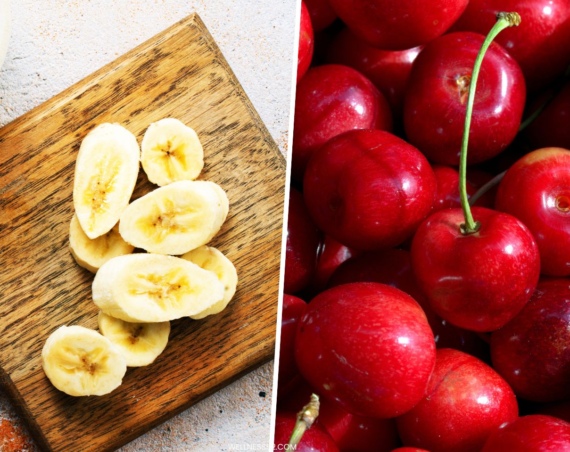
If you are feeling sluggish, trying to lose weight, or maintaining a healthy weight, you may want to try some foods that boost metabolism.
We see claims online all the time for metabolism-boosting solutions, but could whole foods be part of that solution? Recent research confirms that certain foods may increase your fat metabolism.
Your metabolism is influenced by many things and refers to the number of calories that your body burns daily.
Many of these foods may increase your metabolism slightly, but no guarantee simply eating them will cause you to lose weight faster.
You will notice that many of these foods are healthy, whole foods that can be included in your diet year-round to improve your overall health.
19 Foods That Increase Metabolism

Protein-rich foods
We know that protein is an essential nutrient.
Foods that are high in protein, like meat, fish, eggs, dairy, legumes, and nuts, may help speed up your metabolism for the short term.
High-protein foods require more energy to be digested by your body than carbohydrates.
One study found that a high-protein diet that featured tuna, turkey, cottage cheese, and egg whites doubled the thermogenesis of participants almost 3 hours after eating, compared to a high-carbohydrate meal (1).
Research has shown that protein-rich foods increase the thermic effect of food, or TEF, by about 15-30%.
They also help your body hold on to muscle mass and prevent a drop in metabolic function that people often see in sustained weight loss (2, 3, 4).
Protein also promotes the feeling of fullness and leaves you satisfied for hours after you eat. It also helps keep your energy levels up as the day goes on.
Make sure you include protein in all meals and snacks. This could be from beef, pork, poultry, wild game, dairy, fish and seafood, beans, nuts, and seeds (5).
Mineral-rich foods
Like protein, foods that are rich in certain minerals are very important for your metabolism.
Both iron and selenium are required for your thyroid gland to function properly. Your thyroid is the gland that is responsible for your metabolism (6).
If you are not getting enough iron or selenium in your diet, your thyroid gland may not be able to optimize your metabolism, causing it to slow down.
Many foods high in iron and selenium also happen to have a high protein content as well, such as meat, seafood, beans, nuts, and seeds like chia seeds, so be sure to include these regularly in your meal plan.
Chili peppers
If you like spicy food, then you may be boosting your metabolism already! Capsaicin, the compound found in chili peppers that makes them spicy, has been shown to increase metabolism.
Research has found that including hot peppers in your diet may help burn almost 50 extra calories per day. It may not take much, about 9-10 mg per day, or about 1 jalapeño pepper, to burn those extra calories. Another study found that consuming capsaicin supplements before eating a meal may help reduce your appetite (7, 8, 9).
Yet another study found that participants that added cayenne pepper to their meals burned more fat than those that did not. Additionally, capsaicin has been shown to help reduce inflammation in the body and may help keep your heart healthy (10,11).
However, the science on capsaicin’s ability to boost metabolic function is mixed, so take it with a grain of salt, or sprinkle of pepper (12).
Coffee
Coffee lovers, rejoice! Several studies have found that caffeine may help with a healthy metabolism. Research confirms that those who drink about 3 cups of coffee, or 270 mg of caffeine, per day, may burn up to an extra 100 calories (13).
Caffeine may also help your body burn fat for fuel, and may be effective at helping your workout performance (14).
Unfortunately, decaffeinated coffee does not seem to have the same effects.
That said, the effects of caffeine vary between people, and high caffeine intake can cause certain individuals to feel jittery, and restless, or may interrupt sleep.
Additionally, be careful of ordering coffee beverages that add a lot of cream, sugar, and syrups which can add up to a lot more calories.
As always, practice moderation with your cup of morning coffee.
Tea
also contains compounds that may help to boost your metabolism, in addition to the caffeine found in tea.
Certain compounds called catechins may boost metabolism. Additionally, oolong and matcha green tea may help with fat oxidation and burn extra calories.
These teas help your body use up stored fat for fuel more efficiently and can boost your fat-burning ability by 17% (15, 16).
So now you can enjoy that cup of green tea knowing it may help with fat metabolism too!
You can find green tea bags almost everywhere now, or you can look for matcha, ground green tea powder that is dissolved into 6-8 ounces of water.
The benefit of matcha is that you are consuming the whole tea leaf, rather than steeping them and then removing the teabag.
Beans and Legumes
Beans and legumes are nutritional powerhouses. Legumes like black beans, kidney beans, soybeans, lentils, chickpeas, peas, and peanuts contain a lot of protein, selenium, and iron.
They also contain a ton of fiber, including soluble fiber and resistant starches that feed good gut bacteria. All of this helps increase their thermic effect (17, 18, 19).
Good gut bacteria create short-chain fatty acids that may help us use stored fat as fuel more efficiently and can prevent blood sugar spikes (20).
Lentils and peas are especially rich in glutamine, a specific amino acid, which may help burn more calories when digested (21).
Ginger
Ginger is one of the world’s healthiest spices, and research has found it may help boost your metabolism as well.
Recent research has shown that consuming ginger may help improve fasting blood sugar levels, increase your high-density lipoprotein (HDL, or “good” cholesterol), and may help with weight reduction (22).
Another study found that drinking 2 grams of ginger powder dissolved into hot water before a meal may burn up to 43 more calories than just hot water alone (23).
Ginger has antioxidant and anti-inflammatory properties and is known to help with an upset stomach. Plus, it tastes delicious with a unique flavor.
Cacao
Can you believe that chocolate may help boost your metabolism? Research seems to suggest that it may help.
One recent study found that cocoa may stop enzymes that are used to digest fat and carbs, which would prevent the body from digesting them and their calories (24).
Studies done in mice found that cocoa may help make genes that promote burning fat, especially in mice that were fed high-calorie or high-fat diets (25, 26).
There aren’t many studies done on humans and the effects of cocoa on the metabolism, so bear that in mind when you reach for your favorite dessert.
Apple Cider Vinegar
Many people swear by apple cider vinegar for just about every ailment, including weight loss.
Apple cider vinegar may help slow down how quickly your stomach empties and may make you feel fuller for longer periods of time (27).
In studies done on mice, vinegar may help increase the amount of fat that is burned for fuel. It also seemed to decrease liver and belly fat in mice. (28, 29)
That said, there are very few studies on apple cider vinegar on human metabolism, so limit how much vinegar you consume, as it may lead to tooth erosion or damage to the digestive tract lining if consumed in excess (30, 31).
MCT Oil
MCT oil refers to medium-chain triglycerides. Most fat and oil that we see in food are made up of long-chain triglycerides.
MCT may help with the breakdown of stored fat into fatty acids to be burned for energy (32, 33, 34).
This gives MCT oil a high thermic effect.
Studies have shown that MCT oil may increase your metabolism.
Once digested, MCT fats travel directly to the liver to be burned as fuel, and therefore are less likely to be stored as fat in other areas of the body (35).
MCT oil can be bought as a supplement, and added to smoothies or other drinks, but it cannot be used to cook. Alternatively, coconut oil is rich in MCTs and can be used in most cooking and baking.
Water
Here’s some news that will have you reaching for that glass of water. Good hydration is important and it may also help with your metabolic rate.
Research has found that drinking water can increase metabolism by 24-30% for 40-90 minutes.
The additional calories needed to heat the water to body temperature are part of the reason why we see this increase in metabolic rate (36, 37, 38).
This can, of course, vary between individuals. But since we should all be drinking it regularly anyway, this is even more reason to make sure you are drinking enough water.
Seaweed
The thyroid is essential to your metabolic rate. Iodine is one of the most important nutrients that supports a healthy thyroid.
Seaweed is very rich in iodine and can help your thyroid optimize your metabolism.
Making seaweed a regular part of your diet can help you get enough iodine, especially if you are opting more for non-iodized salts like sea salt or pink salt.
Seaweed also contains fucoxanthin, a compound that may help support the best metabolism (39).
These leafy greens are easy to add to your regular diet. Seaweed can be enjoyed in soup, like kelp in miso soup, as a salad, as dried nori sheets used for sushi and gimbap, or alone as a snack.
Broccoli
You always hear about how good green veggies are for you, and broccoli is no exception!
This cruciferous vegetable has glucoraphanin, an antioxidant that may boost your metabolism. Glucoraphanin may help reduce the levels of fat in the blood (40).
Broccoli has also been shown to help reduce cancer risk, boost immunity, improve skin health, and reduce overall inflammation.
To retain most of the nutrients, broccoli is best served simply steamed in a vegetable steamer or microwave.
Avocado
Avocados are so delicious when made in guacamole or served on toast. There are so many health benefits of avocados.
Because of their fiber and healthy fats, they can help you feel full for a long time. But they may also help your metabolism.
In a recent study from Nutrition Journal, participants that consumed avocados saw their risk for metabolic syndrome cut in half.
Metabolic syndrome consists of multiple conditions such as high blood pressure, high blood sugar, and extra body fat that increase the risk of heart disease and diabetes (41).
Flax Seeds
Flaxseeds contain protein, minerals, and other healthy compounds. These seeds may also help boost your metabolism and help with metabolic syndrome.
A recent study on mice found that flaxseeds do seem to help metabolism. It is thought this is because of the fiber, protein, omega-3 fatty acids, and antioxidants found in flaxseeds.
The fiber in flax also helps promote good healthy bacteria in the gut, which may also be how it helps with metabolism (42).
More studies about how flaxseed impacts human metabolism are needed before definitive conclusions can be drawn.
Almonds
Almonds can be used in a variety of ways in so many dishes, from breakfast to snacks to dessert.
They are good sources of iron, and selenium, as well as other nutrients that help support metabolism.
Additionally, the healthy fat in nuts, polyunsaturated fat, is slowly absorbed by the body and needs more energy to be digested (43).
Berries
Who doesn’t like blueberries sprinkled on their cereal, oatmeal, or pancakes? Blueberries are full of vitamins and antioxidants. But these sweet berries may also help your metabolism.
Studies have found that berries may help reduce the risk of metabolic syndrome, a cluster of different risk factors like high blood sugar, blood pressure, cholesterol, and obesity.
It is thought that the antioxidants and anti-inflammatory effects from important components in blueberries, called anthocyanins, are responsible for this (44).
A mice study found that mice that were fed berries did not suffer the detrimental metabolic effects of a high-fat diet, compared to mice fed low-fat diets, or high-fat diets without the berries (45).
Another study done on humans found that overweight and obese participants that ate a healthy diet with the addition of blueberries saw improvements in their BMI, cholesterol levels, insulin, and blood sugar levels.
In fact, the group that ate blueberries saw an additional 3-14% additional loss of body fat and overall weight(46).
Grapefruit
The bright red grapefruit adds a little sunshine to the winter. But these cheerful citrus fruits may also help boost your metabolism too.
One study found that eating half a grapefruit before consuming a meal was linked to weight loss, improved insulin resistance, and an improvement in metabolic syndrome risks.
While drinking grapefruit juice before a meal helped a bit too, it did not yield the same significant results as eating the fruit itself. This may be due to the fiber present in a whole grapefruit (47).
Turmeric
This golden spice has many health benefits and claims surrounding it. It has been proven to help reduce inflammation, and it also can help your metabolism too.
The active compound in turmeric, called curcumin, has been tied to adiponectin expression. Adiponectin helps with blood sugar control and breaking down fat cells.
So adding some of this spice to your foods is a great idea for a variety of health reasons! (48, 49, 50)
Additional Tips to Increase Metabolism
Besides what you eat, there are a few other things you can do to help your metabolism.
Regular exercise is important for keeping your metabolism running quickly and efficiently.
Anything you can do to increase your heart rate will help ramp up your metabolism during exercise, and for about an hour after you have finished your workout (51).
Additionally, getting a good night’s sleep can help your metabolism run properly.
Poor sleep, lack of sleep, or sleep disruption have all been linked to disturbances in the metabolism through things like hormone irregularities, overstimulation of your sympathetic nerve pathway, and inflammation (52).
Make sure you are practicing good sleep hygiene to get better sleep at night by dimming the lights, limiting screen time, and sleeping in a cool room.
The Bottom Line
While certain foods may speed up your metabolic rate for a short period of time, the effects are relatively minimal and short-lived.
That said, many of the foods reviewed in this article are nutrient-dense and health-promoting, and can fit into a healthy lifestyle.
By including these foods regularly in your diet, you may bump up your metabolism, and reap the other health benefits of vitamins, minerals, and antioxidants as well.
While eating these foods may help your metabolism a bit, nothing beats an otherwise healthy diet. A diet that is rich in lean proteins, fruits, veggies, whole grains, and healthy fats.
Regular exercise, physical activity, stress relief, and good-quality sleep
All of these factors work together to promote overall health and avoid unwanted weight gain.


